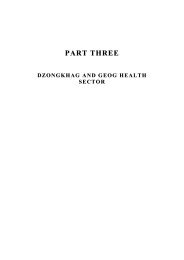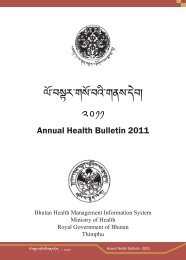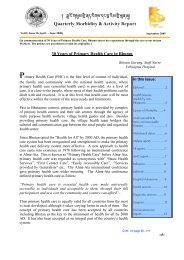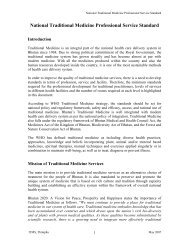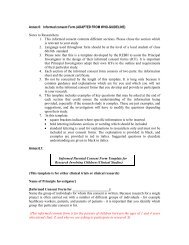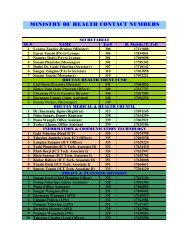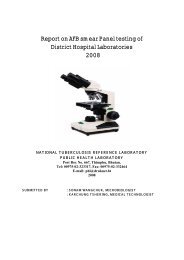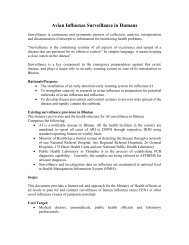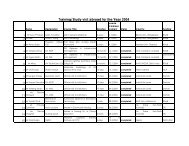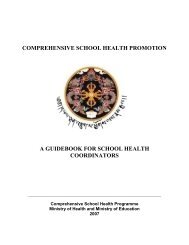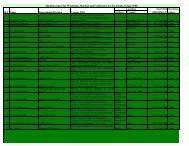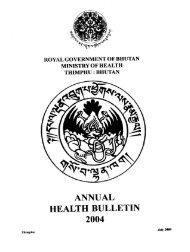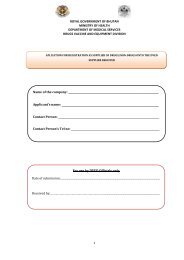I. INTERNAL AUDIT CHARTER - Ministry of Health
I. INTERNAL AUDIT CHARTER - Ministry of Health
I. INTERNAL AUDIT CHARTER - Ministry of Health
Create successful ePaper yourself
Turn your PDF publications into a flip-book with our unique Google optimized e-Paper software.
Government Internal Audit Standards, Royal Government <strong>of</strong> Bhutan<br />
(b)<br />
(c)<br />
Objectivity is presumed to be impaired when individual auditors review<br />
any activity in which they have previously had executive responsibility,<br />
or in which they have provided consultancy advice. Auditors should not<br />
be assigned to assurance work in areas where they have had an<br />
executive or other involvement, and where the Head <strong>of</strong> Internal Audit<br />
deems that this may impair their objectivity, until a suitable period has<br />
elapsed. The Head <strong>of</strong> Internal Audit should develop appropriate<br />
guidelines for determining the duration <strong>of</strong> such periods.<br />
Long-term responsibility for the audit <strong>of</strong> a particular aspect <strong>of</strong> an<br />
organization can also affect independence; assignment <strong>of</strong> ongoing audit<br />
responsibilities should be rotated from time to time.<br />
19.1.5 Declaration <strong>of</strong> conflict <strong>of</strong> interest<br />
(a)<br />
(b)<br />
Individual auditors should declare any conflicts <strong>of</strong> interest arising from<br />
audit work assigned to them by the Head <strong>of</strong> Internal Audit. Such<br />
potential conflicts <strong>of</strong> interest include previous executive or consultancy<br />
responsibilities in the same areas and personal relationships with staff<br />
with current executive responsibilities.<br />
Internal audit should plan the allocation <strong>of</strong> audit work to minimize the<br />
risk <strong>of</strong> conflicts <strong>of</strong> interest whenever possible.<br />
19.2. RELATIONSHIPS WITH MANAGEMENT, OTHER<br />
<strong>AUDIT</strong>ORS AND REVIEW BODIES<br />
19.2.1 Principles <strong>of</strong> good relationship.<br />
Heads <strong>of</strong> Internal Audit should co-ordinate internal audit plans and activities<br />
with line Agencies, other internal auditors, external audit and other review<br />
agencies to ensure that the most effective audit coverage is achieved and<br />
duplication <strong>of</strong> effort is minimized.<br />
19.2.2 Relationship with management.<br />
(a)<br />
(b)<br />
Internal Audit provides a service to management. Its strategy,<br />
planning and delivery should aim to maximize the value added<br />
for management.<br />
Management and staff at all levels <strong>of</strong> the organization should<br />
have complete confidence in the integrity, independence and<br />
capability <strong>of</strong> internal audit. The relationship between internal<br />
auditors and line Agencies is a privileged one, and information<br />
gained in the course <strong>of</strong> audit work should remain confidential to<br />
those with a legitimate interest within the organization.<br />
Internal Audit Section, <strong>Ministry</strong> <strong>of</strong> Finance, Thimphu<br />
Page 15 <strong>of</strong> 28



